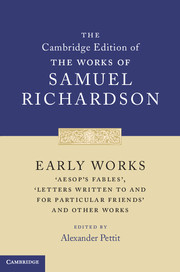Book contents
- Frontmatter
- Dedication
- Contents
- General Editors’ Preface
- Acknowledgements
- Chronology
- List of Abbreviations
- General Introduction
- Textual Introduction
- The Apprentice’s Vade Mecum (1733)
- A Seasonable Examination of the Pleas and Pretensions (1735)
- Preface to Aubin, A Collection of Entertaining Histories and Novels (1739)
- Aesop’s Fables (1739)
- Letters Written to and for Particular Friends (1741)
- Six Original Letters Upon Duelling (1765)
- Appendix: The Infidel Convicted (1731)
- Postscript
- Emendations
- Word-division
- Bibliographical Descriptions of Early Editions
- Explanatory Notes
- Index
General Editors’ Preface
Published online by Cambridge University Press: 30 June 2022
- Frontmatter
- Dedication
- Contents
- General Editors’ Preface
- Acknowledgements
- Chronology
- List of Abbreviations
- General Introduction
- Textual Introduction
- The Apprentice’s Vade Mecum (1733)
- A Seasonable Examination of the Pleas and Pretensions (1735)
- Preface to Aubin, A Collection of Entertaining Histories and Novels (1739)
- Aesop’s Fables (1739)
- Letters Written to and for Particular Friends (1741)
- Six Original Letters Upon Duelling (1765)
- Appendix: The Infidel Convicted (1731)
- Postscript
- Emendations
- Word-division
- Bibliographical Descriptions of Early Editions
- Explanatory Notes
- Index
Summary
The Cambridge Edition of the Works of Samuel Richardson is the first fully annotated scholarly edition of Richardson's works, including his securely attributable minor works, ever to have been undertaken. Five substantial collected editions have been published before now: The Works of Samuel Richardson, with an introduction by Edward Mangin (19 volumes, 1811); The Works of Samuel Richardson, with an introduction by Leslie Stephen (12 volumes, 1883); The Novels of Samuel Richardson, with an introduction by William Lyon Phelps (19 volumes, 1901–2); The Novels of Samuel Richardson, with an introduction by Ethel M. McKenna (20 volumes, 1902); and finally The Novels of Samuel Richardson (18 volumes, 1929– 31). None of these editions, however, contains any explanatory or textual apparatus, and none contains any of Richardson's writings beside his three major novels.
In the absence of any scholarly alternative, the last of these collected editions, the Shakespeare Head edition, has passed as standard for almost a century, though with no visible credentials for doing so. It is attractively printed, on fine paper, but suffers from several obvious shortcomings. First, it is extremely scarce; only five hundred copies were issued, many to individual subscribers, and few libraries possess copies. Second, it was anonymously edited, and a brief note on the text is ambiguous; to what extent, and if so on what principles, the text was modernised or corrected remains unclear. Third, the choice of copy-text for the novels, Richardson's octavo edition in each case, is highly questionable. A compulsive reviser and, unusually, his own printer, with complete and direct control over the production process, Richardson changed the texts of his novels with each edition that he printed. He issued one edition of each novel in octavo, in contrast to the smaller duodecimo size normally used. Intended for wealthier buyers, the octavo editions were printed on better paper, with more generous margins and leading, and, in the case of Pamela, with twenty-nine engravings by two of the foremost book-illustrators of the day. The octavo editions, however, represented a stage in the process of revision that was intermediate and in some respect tangential to the genealogy of the text: in the case of all three novels, Richardson went on to make extensive further changes, working from the previous duodecimo edition and losing many of the octavo revisions as he did so.
- Type
- Chapter
- Information
- Early Works'Aesop's Fables', 'Letters Written to and for Particular Friends' and Other Works, pp. xi - xvPublisher: Cambridge University PressPrint publication year: 2011



